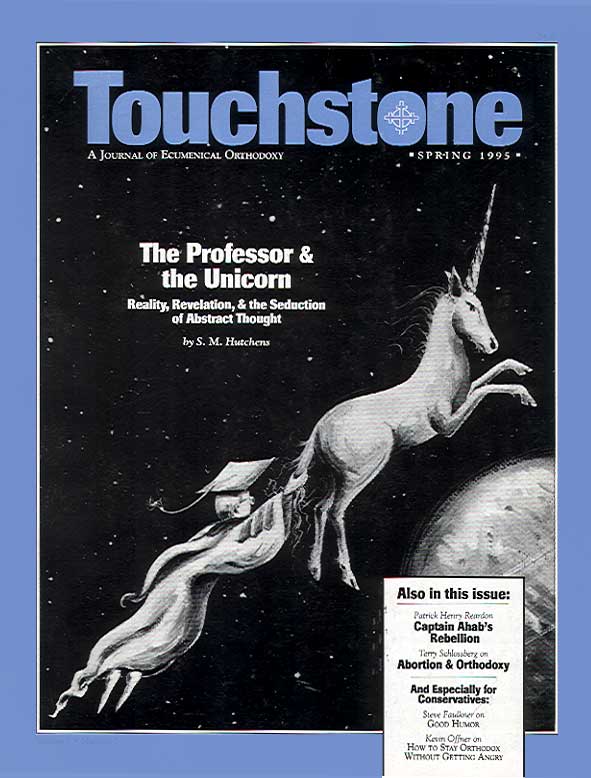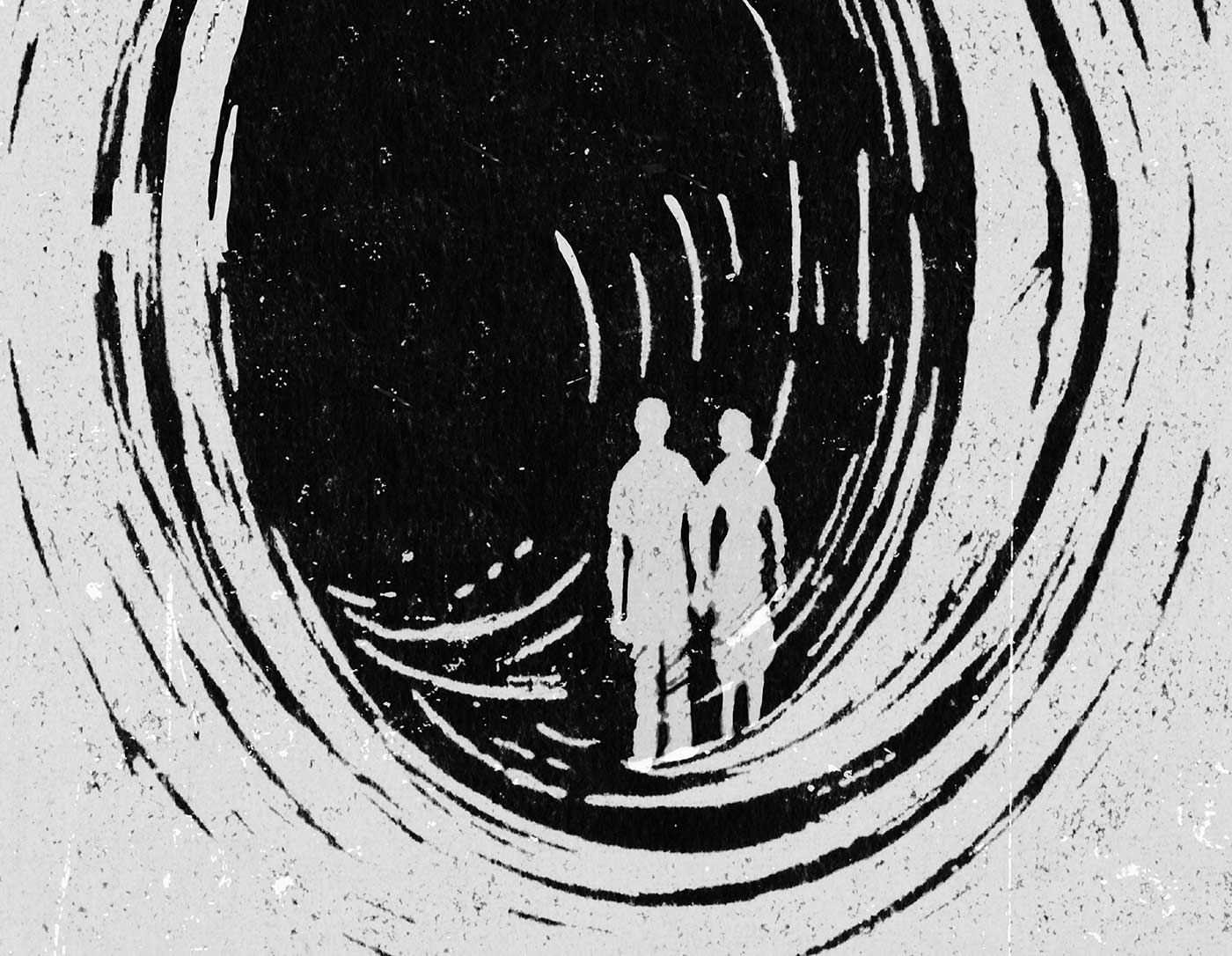The Brothers Grim
Humorlessness Among the Religious and the Irreligious
by Steven Faulkner
Aristotle said that on one side stands the boor who never says anything funny and takes offense at those who do. On the other side stands the buffoon who jokes at everything and “will not keep his tongue off himself or anyone else.” In between is the eutrapelia, the “well-turning” person who stands between the extremes, who can turn to things serious and in good time turn to things jovial as the occasion requires.
Father William Lynch, a famous analyst of humor, places alongside the boor other fierce and serious souls who don’t know how to laugh: the heretic, “who sees all reality as simple and reduces a multitudinous creed to a single, exacerbating, crusading formula”; next is the scrupulous man, “who reduces the overflowing of being and the mind to a worrisome pin point”; and finally the great conquerors “who have the universe under perfect control and have it forever fixed in an icy stare.” Why Father Lynch limits his list to these is unclear, for one can go on and on, listing troops of bitter and malicious types who mutter and bicker in the ranks.
But there are two humorless spirits that I wish to exorcise here. First there is the “religious” man who thinks that laughing is somehow not religious, and second, there is the irreligious man whose ideologies leave no room for laughter. These two are brothers: their father is pride and their prim mother is principle.
The religious brother has decided that the obligations of things divine so weigh us down that we have no time for humor. Everything is serious; our eternal souls are at stake. Why squander eternity for a burst of laughter? It is a trivial diversion, a literal striving after wind. He is a most sincere soul who, like William Bradford, governor of Plymouth Colony forbade “gaming and reveling” on Christmas Day and thought that it was holier to cut timber on the day of our Lord’s birth than to cut up a Christmas turkey or to cut a caper in the streets. The Quaker Robert Barclay wrote:
It is not lawful to use games, sports, plays, nor among other things comedies among Christians, under the notion of recreations, which do not agree with Christian silence, gravity, and sobriety; for laughing, sporting, gaming, mocking, jesting, vain talking, etc., is not Christian liberty, nor harmless mirth.
This pious fever infects not only Puritans, though they may be particularly susceptible, but also imprisons devout Catholics and Protestants of all stripes. Awed by Sin, Death, Final Judgment, Hell, Heaven, Predestination, Eschatology, Ecclesiology, Devils, Neighbors, and Ineluctable Damnation, they eschew laughter. “Sorrow is better than laughter,” sayeth the Preacher. “It is better to go to the house of mourning than to the house of feasting” (Eccl. 7:2,3).
I must admit that we do not find much laughter in the Bible. Perhaps, as G. K. Chesterton wrote in his famous ending to Orthodoxy, “There was some one thing that was too great for God to show us when He walked upon our earth; and I have sometimes fancied that it was his mirth.” Some even have argued that Jesus was not hiding his mirth—a camel squeezing through the eye of a needle or extracting one’s eye to avoid lust is somehow humorous. But I have remained unconvinced by arguments that Jesus was a funny man and we just lose it in translation or miss it because of our solemn expectations. There is, as the Preacher also says, “a time to weep, and a time to laugh; a time to mourn, and a time to dance.” When God Incarnate walked the dusty roads of Judea and Galilee we might make allowance for the disciples if they responded in either ignorance or awe, as they did, rather than in mirth. Peter often put his foot in his mouth, but not intentionally. I think Reinhold Niebuhr was right when he said:
Laughter must be heard in the outer courts of religion, and the echoes of it should resound in the sanctuary; but there is no laughter in the holy of holies. There laughter is swallowed up in prayer and humour is fulfilled by faith.
But if, in the presence of the King of the Universe, we should bow in reverence, in the outer courts, in the presence of our fallible fellows, we might be excused for laughing. For both we and our fellows are funny precisely because we are fallible. Only the proud man or the desperately religious man refuses to laugh with his fellows; the one refuses to recognize his foibles, the other considers his failures sins and not a laughing matter. In the Catholic tradition, such painstaking self-examination is called scrupulosity and is itself considered a sin.
Steven Faulkner teaches creative writing at Longwood University in southern Virginia. He is the author of Waterwalk: A Passage of Ghosts (2007) and Bitterroot: Echoes of Beauty and Loss (2016). Both books are memoirs of father-son journeys that followed the paths of missionary priests: Marquette (in Waterwalk) and De Smet (in Bitterroot).
bulk subscriptions
Order Touchstone subscriptions in bulk and save $10 per sub! Each subscription includes 6 issues of Touchstone plus full online access to touchstonemag.com—including archives, videos, and pdf downloads of recent issues for only $29.95 each! Great for churches or study groups.
Transactions will be processed on a secure server.
more from the online archives

11.5—September/October 1998
Speaking the Truths Only the Imagination May Grasp
An Essay on Myth & 'Real Life' by Stratford Caldecott
calling all readers
Please Donate
"There are magazines worth reading but few worth saving . . . Touchstone is just such a magazine."
—Alice von Hildebrand
"Here we do not concede one square millimeter of territory to falsehood, folly, contemporary sentimentality, or fashion. We speak the truth, and let God be our judge. . . . Touchstone is the one committedly Christian conservative journal."
—Anthony Esolen, Touchstone senior editor










